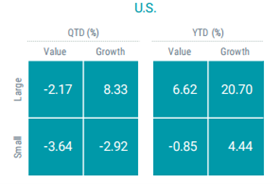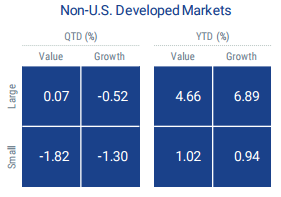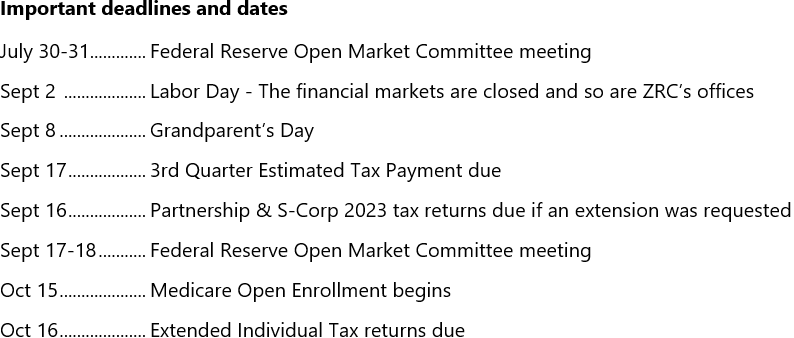We’re delighted to welcome the five new clients that joined Elevation Wealth Partners this quarter. It’s an honor to serve you and we look forward to many years of working together. Thank you for sharing with friends and family how we’ve helped you make the most of your assets, earnings, and time so you can live your best life.
In addition to our quarterly review of the economy and markets, we detail how to find affordable healthcare if you’re not yet eligible for Medicare, and we highlight the children of our company’s employees who graduated this spring.
Quarterly Investment & Economic Review
- Powered by just seven giant AI related stocks (Nvidia, Microsoft, Apple, Amazon.com, Meta Platforms, Alphabet, and Broadcom), the S&P 500 returned 4.38% for the quarter and is up 15.29% year-to-date.
- Mind you not all AI stocks are golden as Intel, Salesforce, Advanced Micro Devices, and Accenture all suffered double digit declines in Q2. Year-to-date, the average stock in the S&P 500 is up just 5% and the stock performance for six of the 11 economic sectors is negative this year.
- Inflation peaked in June 2022 at 9.1% and is currently 3.3% with more declines expected. It is predicted that the Federal Reserve will begin lowering its Fed Funds rate later this year and throughout 2025, making it easier for Americans to buy big ticket items like homes and cars.
- Bond interest rates are outpacing inflation for the first time in many years, which is good news for long-term investors.
- Continued low unemployment and good wage growth is enabling healthy consumer spending and supporting a growing economy.
- It’s nice to see a big rise in people wanting to work since the start of Covid. 77.5% of those aged 18-64 are now in the labor force versus 73.5% in early 2020.
- GDP is forecasted to be 2.6% in 2024, compared with the average over the last ten years of 2.1%. No recession this year!
When one asks, “how is the market doing”, what they usually mean is how is the S&P 500 doing. The trouble is that this index is not an average of the largest 500 stocks in the U.S., but it is weighted by size, and there are a handful of extremely large companies that end up dominating this index. In fact, the ten largest companies in the index comprise 37% of the S&P 500. It wasn’t always this way – in the 25 years since prior to Covid, it ranged from 18-26%.

Companies in the top ten have skyrocketed in value, up 44% year-to-date leaving the other 490 stocks in the dust, up just 4.5%. The S&P 500 finished the first half of 2024 up 15.3% but you now know that if your large U.S. stock investments weren’t heavily weighted toward these massive companies, your performance won’t be likely be beating the S&P 500.


“The market” definitely doesn’t include small U.S. stocks which investors consider to be riskier and more economically sensitive. Investors are nervous because higher interest rates risk putting the economy into a recession. The small cap growth index consists of faster growing companies and rose just 4.4%. The small cap value index contains slower growing, but more stable companies and fell year-to-date, down 0.9%. Thankfully, rates are more likely to fall over the next 12 months than rise and most economists do not believe a recession is imminent. That would be good news for small U.S. stocks.
Despite representing $30 trillion of market value, international stocks aren’t considered part of “the market” either. Large international developed market stocks are up 5.0% which is pretty good for just six months, nowhere near where the S&P 500 is, but better than the average stock in the S&P 500! Amongst the major international countries, India and Japan are leading the way so far this year with returns of 14% and 7%, respectively.

Income oriented investments such as bonds have fallen 0.7% so far in 2024 and real estate investment trusts are down 2.7% year-to-date. The 10-year Treasury Note yielded 3.9% to start the year but it’s now up to 4.4%. Rising interest rates are bad for bonds because newly issued bonds at higher rates compete with existing bonds. For real estate, most companies use debt to purchase buildings and higher rates means higher interest expense. Lower interest rates would likely drive returns higher for income investments.

Keeping things in perspective
Sometimes it’s easy to lose sight of the forest for the trees. Investors should be investing for the long-term but often react to events that, while serious, typically do not last longer than a year or two and in any event, do not have any relationship to their investments. Today, we are dismayed with violence in the Middle East and Eastern Europe, many are distraught by the political situation here in the US ahead of November’s elections, and inflation has stressed many Americans. Despite these and other worries, we have always faced crises of some kind or another and as they pass, most of them quietly fade from memory. All the while, interest and dividends are paid, and investments move higher in line with an expanding economy. Staying focused on the long-term is critical to staying on target to reach your financial goals.
For more see our 2nd Quarter 2024 Market Review Slides.



Children of Elevation Wealth Partners Graduate!
We are thrilled to share that Andrew’s daughter, Emily, graduated magna cum laude from James M. Bennett High School on May 30, 2024. This summer, she will be interning at NASA, showcasing her passion for engineering and mathematics. Emily will continue her academic journey at Salisbury University in Maryland this fall, focusing on furthering her expertise in these fields. To connect with her on LinkedIn click here.
Barry and Kristin’s youngest daughter Elliot graduated from Northgate High School in May. In August, she will be attending Clemson University to pursue a degree in Food Science. To connect with her on LinkedIn click here. Go Tigers!
Steve and Betsy’s son Jake graduated from University of Michigan with a B.S. in Engineering. This summer he’s an engineer intern with Uber in New York City and in the Fall he will be back at Michigan in the Masters of Engineering program specializing in computer science. To connect with him on LinkedIn click here.

Sources:
Avantis Investors, by American Century Investments – Monthly ETF Field Guide
The information provided in this article is for general informational purposes only and does not constitute legal, tax, insurance, or financial advice. J.P. Morgan Asset Management, Guide to the Markets All investing is subject to risk, including the possible loss of the money you invest. Past performance is no guarantee of future returns. Diversification does not ensure a profit or protect against a loss in a declining market. There is no guarantee that any particular asset allocation or mix of funds will meet your investment objectives or provide you with a given level of income. The performance of an index is not an exact representation of any particular investment, as you cannot invest directly in an index.

